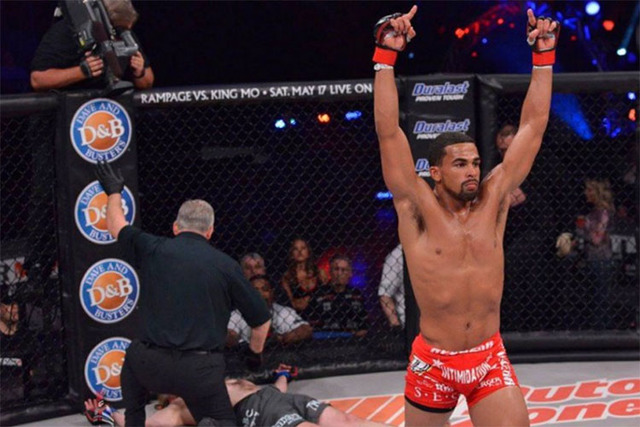Deceased MMA fighter Jordan Parsons diagnosed with CTE

Former Bellator fighter Jordan Parsons, who died six months ago when he was struck by an alleged drunken driver in south Florida, is the first professional mixed martial artist with a publicly identified case of diagnosed chronic traumatic encephalopathy (CTE).
The Boston Globe reported the discovery Thursday.
Parsons, who was 25, was a rising star in Bellator MMA. He was preparing for a fight when he was struck by an SUV while he crossed the street in a crosswalk on May 1.
He died in a hospital three days later.
“Jordan was a shining star in this sport and a beloved member of the Bellator family who we miss very much and we continue to honor through the ‘Jordan Parsons Memorial Scholarship Fund,’” Bellator president Scott Coker said Thursday in a statement to the Review-Journal. “Bellator MMA is committed to the safety of our fighters and has been a strong supporter of the Cleveland Clinic (Professional Fighters Brain Health Study) for the last few years.”
The UFC, the Las Vegas-based industry-leading organization, also has supported the study. UFC officials did not respond Thursday to a request for comment.
CTE is a progressive degenerative disease believed to be caused by repeated head trauma. It is often found in athletes with repeated concussions.
Parsons’ diagnosis was disclosed by Dr. Bennet Omalu, according to the Globe. He also revealed Thursday the discovery of CTE in professional wrestlers Jon Rechner and Brian Knighton, who both died this year at age 44.
WWE officials declined comment to the Globe.
The NFL settled a class-action lawsuit filed by former players over concussions for $1 billion, though the award has been appealed as insufficient. Former NHL players and ex-pro wrestlers have filed similar lawsuits.
“These findings confirm that the danger of exposure to CTE is not limited to just football, hockey and wrestling,’’ Omalu told the Globe. “Mixed martial arts is also a dangerous sport, and it’s time for everyone to embrace the truth.’’
Omalu’s brain autopsy of Mike Webster helped lead to the widespread discovery of CTE in former NFL players. He was portrayed by Will Smith in the movie “Concussion.” Omalu, who runs a charitable foundation focused on the dangers of brain injuries, did not perform the autopsies on the deceased athletes.
He reviewed and endorsed the work of Dr. Julia K. Kofler, a neuropathologist at University of Pittsburgh Medical Center Presbyterian, which is affiliated with Omalu’s foundation.
CTE can only be diagnosed through brain autopsies.
“As a scientist, a physician and a person of faith, I beg everybody involved with these sports to come together and identify the problems and find solutions,’’ Omalu told the Globe.
Parsons was knocked out just once in his career, when he was stopped in 71 seconds by Lazar Stojadinovic to lose the Championship Fighting Alliance featherweight title in June 2012.
Parsons, a former high school wrestler in Michigan, turned pro in MMA at age 20 and trained at the famed Blackzilians camp in Florida alongside UFC stars Rashad Evans and Vitor Belfort.
Omalu dismissed the possibility that Parsons’ CTE could have been caused by the car accident because it’s “a chronic disease that develops over time.”
Parsons’ mother, Anna Morsaw, sent video of his knockout loss and also a knockdown he suffered as the result of a kick in his final fight, a split-decision loss to Bubba Jenkins in November 2015, to attorney Konstantine Kyros, who is representing the group of former wrestlers in their CTE case and also worked with the NFL players.
Kyros then procured Parsons’ brain for the autopsy. He told the Globe he has no plans to sue Bellator, only that he hoped to explore whether athletes in other sports were at risk for similar issues.
“Out of the tragedy of Mr. Parsons’s death, I hope the results serve to both warn and educate other athletes and their doctors about the hidden risks involved,’’ Kyros told the Globe.
The UFC in February announced a five-year extension of its partnership and a $1 million commitment to the Cleveland Clinic brain study at the Lou Ruvo Center for Brain Health in Las Vegas.
At the time, UFC chief operating officer Ike Lawrence Epstein said investment in fighter safety was important to the organization.
“Research and awareness are key in setting new standards for athlete health and safety,” Epstein said. “UFC is always looking for opportunities to invest in industry-leading health and wellness programs and providing resources to develop its athletes inside and outside the octagon.”
Bellator also has partnered with the clinic to participate in the study.
Contact Adam Hill at ahill@reviewjournal.com or 702-277-8028. Follow @adamhilllvrj on Twitter.